
ATMOSPHERE-OCEAN
Scope & Guideline
Uniting Atmospheric Insights and Oceanic Discoveries
Introduction
Aims and Scopes
- Climate Change and Its Impacts:
Research in this area explores the effects of climate change on atmospheric conditions, ocean temperatures, sea-level rise, and extreme weather events, particularly in the Canadian context. - Oceanography and Marine Sciences:
The journal publishes studies related to ocean circulation, biogeochemical processes, and marine ecosystems, including modeling and observational approaches to understand ocean dynamics. - Meteorological and Climatological Studies:
This includes the examination of weather patterns, precipitation trends, and atmospheric phenomena, utilizing both observational and modeling techniques to advance understanding of meteorology. - Hydrology and Water Resources:
Research on hydrological processes, including precipitation, evaporation, and water resource management, particularly in relation to climate variability and change. - Statistical and Computational Methods:
The use of advanced statistical methods and computational models to analyze climate data, assess uncertainties, and improve predictive capabilities in weather and climate forecasting.
Trending and Emerging
- Machine Learning Applications in Climate Science:
The integration of machine learning techniques for analyzing climate data and predicting weather patterns has emerged as a significant trend, showcasing the potential for innovative approaches to complex climate challenges. - Extreme Weather Events and Climate Variability:
Research focusing on the analysis and prediction of extreme weather events, such as heavy precipitation and storms, has increased, highlighting the urgency of understanding their relationship with climate change. - Biogeochemical Cycles in the Ocean:
There is a growing emphasis on understanding biogeochemical processes in marine environments, particularly how they are affected by climate change and human activities, which is crucial for ecosystem management. - Regional Climate Projections:
Studies providing detailed regional climate projections, especially for Canadian contexts, have become more prominent, reflecting the need for localized data to inform policy and adaptation strategies. - Interdisciplinary Approaches:
An increasing trend towards interdisciplinary research that combines oceanography, meteorology, and environmental science to address complex climate issues has been observed, promoting comprehensive understanding and solutions.
Declining or Waning
- Historical Climate Reconstructions:
While historical climate data is still relevant, the frequency of publications focusing solely on reconstructing past climates has decreased, possibly due to a shift towards more immediate climate impacts and predictive modeling. - Traditional Statistical Methods:
There has been a noticeable reduction in the use of traditional statistical methods for climate analysis, as researchers increasingly adopt machine learning and advanced computational techniques for data analysis. - Local Case Studies:
Research focusing specifically on localized climate phenomena without broader implications appears to be waning, as there is a growing emphasis on studies that connect local findings to global climate systems.
Similar Journals
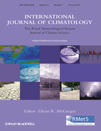
INTERNATIONAL JOURNAL OF CLIMATOLOGY
Pioneering research that shapes our understanding of climate dynamics.INTERNATIONAL JOURNAL OF CLIMATOLOGY, published by WILEY, is a leading peer-reviewed journal dedicated to advancing our understanding of climate science. As a prominent periodical within the Q2 category of Atmospheric Science, it encompasses a wide range of topics related to climatology, including climate variability, modeling, and impacts of climate change, making it an essential resource for researchers, professionals, and students in the field. With a history of publication spanning from 1989 to 2024, the journal has established a strong reputation for disseminating high-quality research that informs policy and practice. Though it does not offer Open Access options, its articles are accessible to a broad audience through institutional subscriptions, ensuring that significant findings can reach those who need them most. The INTERNATIONAL JOURNAL OF CLIMATOLOGY plays a crucial role in connecting academia with pressing environmental issues, thus fostering dialogue and innovation in climate research.

Earth and Space Science
Exploring the Frontiers of Earth and Space.Earth and Space Science, published by the American Geophysical Union, is a distinguished open-access journal that has profoundly impacted the realms of earth and planetary sciences as well as environmental science since its inception in 2014. With impressive rankings, including Q1 in both Earth and Planetary Sciences and Environmental Science for 2023, this journal ranks 38th out of 195 in the general Earth and planetary sciences category and 51st out of 219 in environmental science, showcasing its commitment to high-quality research dissemination. The journal serves as a vital platform for researchers, professionals, and students, fostering the exploration of critical topics and advancements within these pivotal fields. With an accessible format, researchers can benefit from the rich content available, furthering their knowledge and ensuring that groundbreaking discoveries reach a broader audience. The journal's ongoing commitment to open access aligns with contemporary trends in scholarly communication, emphasizing inclusion and collaboration in tackling pressing global challenges.
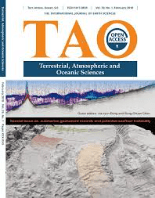
TERRESTRIAL ATMOSPHERIC AND OCEANIC SCIENCES
Championing Open Access for Global Scientific DialogueTERRESTRIAL ATMOSPHERIC AND OCEANIC SCIENCES, published by SpringerNature, is a distinguished peer-reviewed journal that has been an essential platform for innovative research in the fields of atmospheric science, oceanography, and Earth and planetary sciences since its inception. With an Open Access policy established in 1990, the journal ensures wide dissemination of knowledge, allowing researchers, professionals, and students to access cutting-edge findings without restrictions. Based in Switzerland and featuring a comprehensive coverage from 1996 to 2024, the journal currently holds a Q3 ranking across various categories, indicating its growing significance in the scientific community. Although it is positioned within the 39th percentile in Earth and Planetary Sciences, its commitment to fostering high-quality research makes it a valuable resource for advancing understanding of terrestrial environments and their interconnections. Researchers seeking a platform for their work in atmospheric and oceanic sciences will find TERRESTRIAL ATMOSPHERIC AND OCEANIC SCIENCES to be an ideal venue for sharing their insights with a global audience.
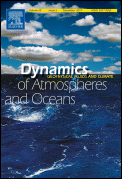
DYNAMICS OF ATMOSPHERES AND OCEANS
Bridging Disciplines for a Sustainable FutureDYNAMICS OF ATMOSPHERES AND OCEANS, published by Elsevier, is a renowned journal that has established itself as a vital resource in the fields of atmospheric science, oceanography, and geology. With a rich publication history stretching from 1976 to 2024, this journal provides a platform for high-quality research that addresses the complex interactions between the atmosphere and oceans, which are critical to understanding climate change and environmental systems. It enjoys a respectable impact factor and a reputable position within its category quartiles, specifically noted as Q2 in critical domains such as Computers in Earth Sciences and Oceanography. Researchers and professionals benefit from its indexed coverage, featuring a Scopus ranking that places it among the leading journals in its categories. Although it is not an open-access journal, readers can access its cutting-edge articles through institutional subscriptions or individual purchases. The journal aims to foster cross-disciplinary dialogue and innovation by publishing original research, reviews, and insightful commentary, making it a cornerstone for scholars, students, and practitioners committed to advancing knowledge in the dynamic interplay of Earth's atmospheric and oceanic systems.

Journal of Tropical Meteorology
Empowering Meteorological Insights for a Changing ClimateJournal of Tropical Meteorology, published by JOURNAL OF TROPICAL METEOROLOGICAL PRESS, is a leading scholarly journal dedicated to advancing the understanding of atmospheric phenomena and meteorological patterns in tropical regions. With an ISSN of 1006-8775, this journal plays a vital role in disseminating high-quality research, focusing on critical issues such as climate variability, weather forecasting, and tropical cyclone dynamics. The journal, which is indexed in Scopus with a respectable rank in the low quartile of Q3 in Atmospheric Science, aims to provide a platform for researchers and professionals to share groundbreaking insights and foster collaboration within the scientific community. Although it follows a traditional access model, the Journal of Tropical Meteorology encourages submissions from a diverse range of disciplines, thus enriching the field with a variety of perspectives. By bridging theory and practical applications, this journal serves as an essential resource for students, researchers, and practitioners striving to expand their knowledge and contribute to the global conversation on meteorology.
Journal of Meteorological Research
Navigating the Future of Weather Science.The Journal of Meteorological Research, published by SPRINGER HEIDELBERG, stands as a vital resource in the fields of Atmospheric Science and Ocean Engineering, boasting an impressive impact factor that reflects its scholarly significance. With its ISSN 2095-6037 and E-ISSN 2198-0934, the journal offers an open access platform, fostering accessibility and dissemination of cutting-edge research. Established in 2014 and running through to 2024, it is particularly distinguished in 2023 as Q2 in Atmospheric Science and Q1 in Ocean Engineering, underscoring its important contributions to these disciplines, with remarkable rankings in Scopus that place it in the top tiers of both categories. The journal accepts a broad range of research articles, reviews, and innovative methodologies, catering to a diverse audience of researchers, professionals, and students eager to advance their knowledge and expertise in meteorological studies. This makes the Journal of Meteorological Research an essential platform for anyone engaged in understanding and addressing the complex challenges of our changing climate.

Atmospheric Science Letters
Fostering innovation through open-access research.Atmospheric Science Letters, published by WILEY, is a leading open-access journal in the field of Atmospheric Science. Since its establishment in 2000, it has significantly contributed to advancing knowledge related to the Earth's atmosphere, focusing on both theoretical and practical aspects. With an impressive Q2 ranking in the Atmosphere Science category as of 2023 and a Scopus rank of 62 out of 148, this journal provides a platform for researchers and professionals to share their findings and insights. The journal’s commitment to open access since 2016 ensures that cutting-edge research is accessible to a global audience, fostering collaboration and innovation in the atmospheric sciences. Addressed from its headquarters at 111 River St, Hoboken, NJ, USA, Atmospheric Science Letters is pivotal for students, researchers, and professionals seeking to stay abreast of the latest developments in this dynamic field.
SOLA
Connecting researchers worldwide to unravel atmospheric mysteries.SOLA is a distinguished journal published by the Meteorological Society of Japan, focusing on cutting-edge research in the field of atmospheric science. Since transitioning to an Open Access model in 2018, SOLA aims to facilitate the dissemination of knowledge and foster collaboration among researchers from around the globe. With a proud history spanning from 2005 to 2024, the journal has earned a reputation for high-quality publications, achieving a Q1 ranking in Atmospheric Science according to the 2023 category quartiles. Although its H-Index is currently not available, SOLA is recognized in Scopus rankings, standing at #82 out of 148 in Earth and Planetary Sciences, demonstrating its impact in the field. With its headquarters in Tokyo, Japan, and an unwavering commitment to advancing scientific understanding, SOLA serves as an essential resource for researchers, professionals, and students dedicated to exploring the complexities of atmospheric phenomena.
JOURNAL OF THE METEOROLOGICAL SOCIETY OF JAPAN
Pioneering Research in Climate and WeatherJournal of the Meteorological Society of Japan, ISSN 0026-1165 (E-ISSN 2186-9057), is a leading academic journal published by the Meteorological Society of Japan, dedicated to advancing the field of atmospheric sciences. Established in 1905, the journal has a long-standing tradition of publishing high-quality research that contributes to our understanding of meteorology, climatology, and environmental science. As an Open Access journal since 2018, it ensures wide dissemination of knowledge, allowing researchers, professionals, and students to access cutting-edge studies without barriers. With an impressive impact factor and ranked in the Q1 category in Atmospheric Science, it is recognized for its significant contributions, currently holding a Scopus rank of #36 out of 148 in the field. The journal serves as a vital resource for those involved in meteorological research, policy-making, and education, fostering collaboration and innovation within and beyond Japan.
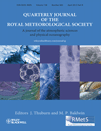
QUARTERLY JOURNAL OF THE ROYAL METEOROLOGICAL SOCIETY
Pioneering research for a deeper understanding of meteorological phenomena.The Quarterly Journal of the Royal Meteorological Society, published by Wiley, stands as a prestigious platform in the field of Atmospheric Science, with a commendable impact reflected in its Q1 quartile ranking and a notable Scopus rank of 4th out of 148, placing it in the 97th percentile among its peers. With origins tracing back to 1873, this journal has established itself as a cornerstone for disseminating high-quality research, engaging articles, and innovative methodologies that advance our understanding of meteorological phenomena. Although it is not an open-access journal, the rigorous peer-review process ensures that only the most significant contributions are published, making it essential reading for researchers, professionals, and students dedicated to atmospheric and planetary sciences. For those interested in cutting-edge findings and comprehensive reviews, the Quarterly Journal of the Royal Meteorological Society is an invaluable resource in enhancing scientific knowledge and collaboration in this dynamic and evolving field.